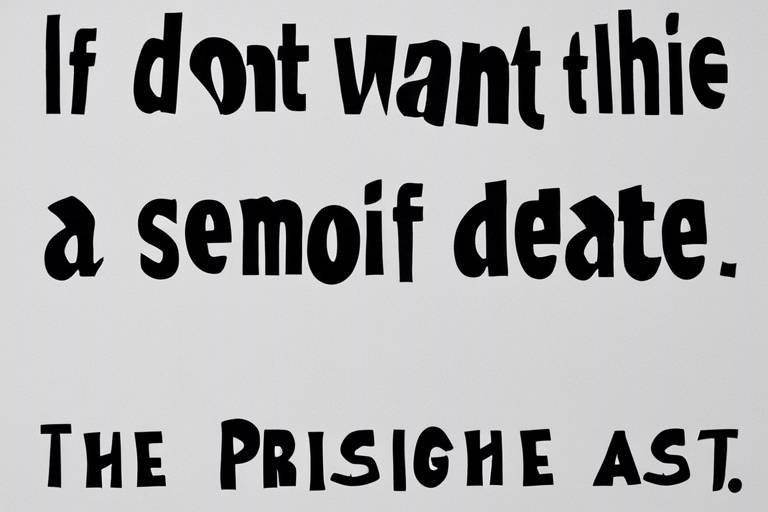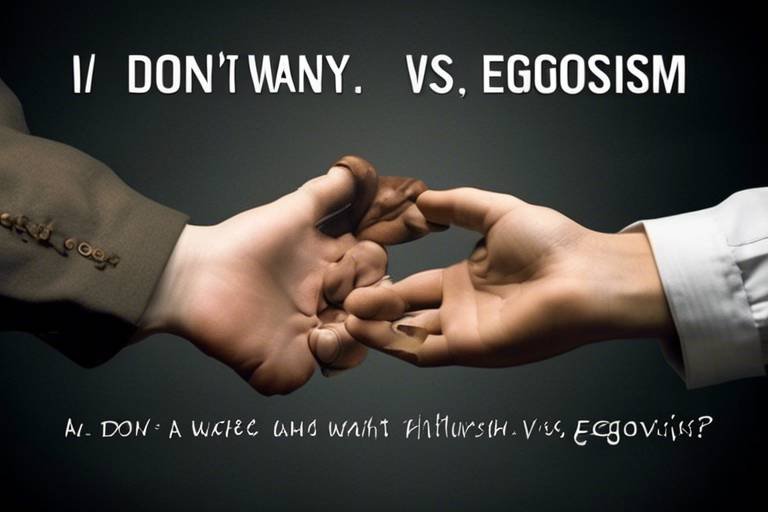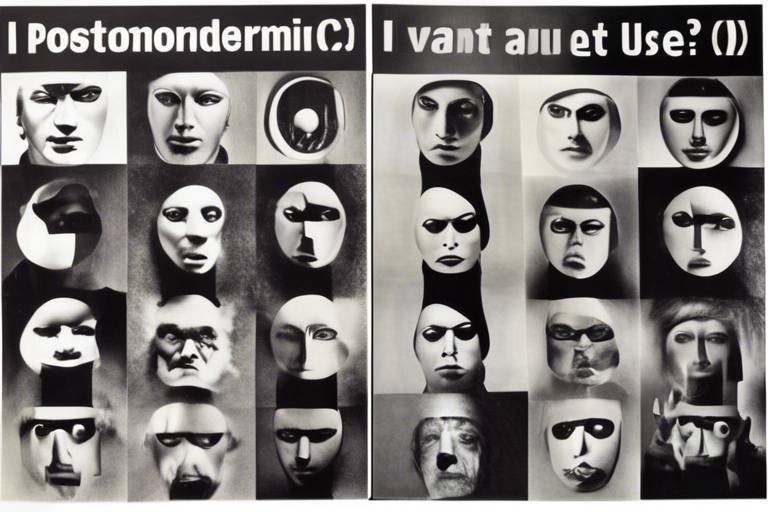The Existence of Moral Facts - A Philosophical Debate
The concept of moral facts has sparked intense discussions among philosophers, ethicists, and everyday individuals alike. What are moral facts? Can they exist independently of our beliefs and cultural norms? This article aims to explore the ongoing philosophical discourse surrounding moral facts, examining various perspectives, arguments, and implications for ethics and morality in contemporary society. While some assert that moral truths are absolute and universal, others argue they are merely subjective opinions shaped by societal contexts. This debate is not just an academic exercise; it has real-world implications for how we navigate moral dilemmas in our daily lives.
Understanding what constitutes moral facts is essential to this debate. Moral facts are often described as objective truths about right and wrong, independent of individual perspectives. For instance, the assertion that "murder is wrong" is seen by many as a moral fact, rather than a mere opinion. In contrast, subjective opinions are influenced by personal experiences and cultural backgrounds. This distinction is crucial because it raises questions about whether morality is universal or if it varies from one society to another. Are moral facts like mathematical truths—unchanging and universally applicable—or are they more akin to fashion trends that evolve over time?
Proponents of moral realism assert that moral facts exist independently of human beliefs. They argue that certain moral truths are self-evident and can be recognized through moral intuition. This idea suggests that just as we can intuitively grasp mathematical truths, we can also understand moral truths. One of the key arguments supporting moral realism is the existence of objective standards that guide moral judgments. For example, consider the universal condemnation of acts like genocide or torture. These actions are often deemed wrong regardless of cultural context, indicating a potential moral fact at play.
The philosophical underpinnings of moral realism are critical for understanding its validity. Influential philosophers such as Immanuel Kant and G.E. Moore have contributed significantly to this discourse. Kant's categorical imperative, which posits that one should act only according to that maxim whereby you can at the same time will that it should become a universal law, is a cornerstone of moral realism. Similarly, Moore's "open question argument" challenges the idea that moral properties can be reduced to natural properties, asserting that moral facts exist in their own right.
Prominent philosophers like Kant and Moore have shaped the discourse on moral facts and realism, providing a historical context for current debates. Their works laid the groundwork for understanding morality as a domain that can be explored through rational inquiry rather than mere opinion. Kant's emphasis on duty and moral law contrasts with Moore's focus on the intrinsic nature of moral truths, illustrating the diverse approaches within moral realism.
Critics of moral realism argue against its assertions, positing that moral beliefs are not universal but rather culturally constructed. This section explores the main counterarguments, focusing on the challenges posed by relativism and subjectivism in moral philosophy. For instance, if moral facts existed independently, why do different cultures have vastly different moral codes? This question highlights the difficulty in asserting the universality of moral facts.
The existence of moral facts carries significant implications for ethics and law. If moral facts are indeed objective, they could serve as a foundation for legal systems and ethical frameworks. This subsection examines how moral realism influences moral decision-making and societal norms. For example, if society acknowledges certain actions as morally wrong based on objective standards, it may lead to more consistent legal repercussions for those actions.
Despite the arguments for moral realism, many philosophers challenge the existence of moral facts. This section discusses the major objections and alternative theories, such as moral anti-realism and constructivism. Moral anti-realism posits that moral statements do not correspond to objective facts, suggesting instead that they are expressions of emotional responses or social conventions. This perspective forces us to reconsider the nature of moral discourse and whether we can truly claim any moral statement as fact.
Moral anti-realism posits that moral statements do not correspond to objective facts. This subsection explains the different forms of anti-realism and their implications for understanding morality. For instance, emotivism suggests that moral statements are merely expressions of feelings rather than assertions of fact. This challenges the notion of moral facts by emphasizing the subjective nature of moral discourse.
Constructivism offers a unique perspective on moral facts, suggesting that moral truths are constructed rather than discovered. This part explores how constructivist theories contribute to the moral debate. Constructivists argue that moral truths arise from social agreements and shared understandings rather than existing independently. This view opens up possibilities for moral evolution and change, as societies can construct new moral truths based on changing values and contexts.
As discussions about moral facts evolve, the future of moral philosophy remains uncertain. This section speculates on potential developments and the impact of emerging ethical theories on the debate. With advancements in technology and shifts in societal values, our understanding of morality may continue to transform. Will we find new ways to reconcile differing moral perspectives, or will the debate over moral facts persist as a fundamental philosophical challenge?
- What are moral facts? Moral facts are objective truths about what is right and wrong, independent of individual beliefs.
- What is moral realism? Moral realism is the view that moral facts exist independently of our perceptions or beliefs.
- Who are some key philosophers in this debate? Influential figures include Immanuel Kant and G.E. Moore, who have significantly shaped the discourse on moral facts.
- What is moral anti-realism? Moral anti-realism posits that moral statements do not correspond to objective facts and are instead expressions of personal or cultural beliefs.
- How does constructivism relate to moral facts? Constructivism suggests that moral truths are socially constructed rather than discovered, allowing for moral evolution over time.

The Nature of Moral Facts
Understanding the essence of moral facts is crucial as we navigate the intricate landscape of ethics and morality. What exactly are moral facts? Are they universal truths that exist independently of our beliefs, or are they merely reflections of individual or cultural perspectives? To answer these questions, we must first differentiate moral facts from subjective opinions and cultural norms.
Moral facts, in their essence, are often described as objective truths about what is right or wrong, good or bad. They stand apart from personal feelings or societal customs, which can vary significantly from one culture to another. For instance, while one society may hold a particular practice as morally acceptable, another may view it as reprehensible. This divergence highlights the importance of establishing a foundation for moral facts that transcends these subjective experiences.
To further illustrate, consider the following characteristics that are commonly attributed to moral facts:
- Universality: Moral facts are believed to apply to all individuals, regardless of their personal beliefs or cultural backgrounds.
- Independence: They exist independently of human opinions, suggesting that moral truths do not change based on societal trends or individual preferences.
- Objective Standards: Moral facts are often seen as grounded in objective standards that can be rationally discussed and debated.
This understanding leads us to ponder: if moral facts are indeed objective, how do we come to know them? Are they discovered through reason, intuition, or perhaps a combination of both? Philosophers have long debated the mechanisms through which we access moral truths, with some arguing that our moral intuitions serve as a reliable guide. This perspective posits that our innate sense of right and wrong can reveal underlying moral facts that exist beyond our conscious awareness.
However, the concept of moral facts is not without its complexities. The interplay between moral facts and human beliefs introduces a layer of nuance that complicates our understanding. For example, if two individuals hold opposing beliefs about a moral issue, does that mean one is wrong? Or could it be that their differing perspectives stem from varying interpretations of the same moral fact? This question underscores the intricate relationship between morality and human cognition, prompting further inquiry into the nature of moral truths.
As we delve deeper into the philosophical discourse surrounding moral facts, it becomes evident that this exploration is not merely an academic exercise. The implications of accepting or rejecting the existence of moral facts extend into our everyday lives, influencing our ethical decision-making and societal norms. In a world where moral disagreements are commonplace, understanding the nature of moral facts is essential for fostering meaningful dialogue and promoting ethical behavior.
In conclusion, the nature of moral facts remains a profound and multifaceted topic in philosophy. By examining their characteristics and the ways in which we engage with them, we can better appreciate the complexities of morality and its relevance in our lives. As we continue to navigate ethical dilemmas, the question of whether moral facts exist and how we can discern them will undoubtedly remain at the forefront of philosophical inquiry.
- What are moral facts? Moral facts are objective truths about what is right or wrong, existing independently of human beliefs.
- How do we know moral facts? Philosophers debate whether we access moral facts through reason, intuition, or a combination of both.
- Are moral facts universal? Yes, moral facts are generally considered to apply universally, regardless of individual or cultural differences.

Arguments for Moral Realism
The debate surrounding the existence of moral facts is not just an abstract philosophical exercise; it has real-world implications that touch upon our everyday lives. Proponents of moral realism argue that moral facts exist independently of our beliefs and opinions, much like physical facts about the world. Imagine a world where the laws of physics were merely suggestions rather than hard truths. In such a scenario, gravity could be dismissed as a mere opinion, leading to chaos. Similarly, moral realists contend that dismissing moral facts could lead to a breakdown of ethical standards.
One of the core arguments for moral realism is the role of moral intuition. Many people experience a gut feeling about what is right or wrong, which often aligns with widely accepted moral principles. This intuition suggests that there may be an underlying reality to moral truths, much like how our senses inform us about the physical world. For example, when we see a child being harmed, our immediate reaction is often one of outrage, indicating a shared moral understanding that transcends individual opinions. This shared moral intuition points to a collective recognition of moral facts that exist beyond mere subjective belief.
Moreover, moral realists argue for the existence of objective standards that guide moral judgments. Just as we can measure the temperature of a room or the distance between two points with objective tools, moral realists believe that we can assess moral actions against objective criteria. These standards are not merely cultural constructs but are believed to be universally applicable. For instance, the principle that "murder is wrong" is not just a cultural sentiment but a moral fact that should hold true regardless of societal norms. This perspective is crucial in discussions about human rights, where the universality of moral facts underpins the argument that certain rights should be afforded to all individuals, regardless of their background or beliefs.
To further illustrate the arguments for moral realism, consider the following table that summarizes key points:
| Argument | Description |
|---|---|
| Moral Intuition | Shared gut feelings about right and wrong suggest underlying moral truths. |
| Objective Standards | Existence of universal moral principles that guide ethical behavior. |
| Consistency Across Cultures | Similar moral beliefs across diverse cultures indicate objective moral facts. |
Additionally, moral realists often point to the consistency of moral beliefs across different cultures as evidence of moral facts. While cultural practices may vary significantly, certain moral principles—such as the condemnation of murder or the value of honesty—tend to be universally recognized. This consistency suggests that there are moral truths that transcend cultural relativism, reinforcing the idea that moral facts exist independently of human perception.
In conclusion, the arguments for moral realism highlight the importance of recognizing moral facts as objective realities that guide our ethical decisions. By acknowledging the existence of these facts, we can foster a more coherent understanding of morality that transcends individual beliefs and cultural differences. As we continue to navigate the complexities of moral philosophy, embracing the notion of moral realism may help us cultivate a more just and ethical society.

Philosophical Foundations
To truly grasp the essence of moral realism, we must delve into its , which provide the bedrock for this intriguing debate. At its core, moral realism posits that moral facts exist independently of our perceptions or beliefs. This concept challenges us to reconsider how we understand morality in a world often colored by subjective opinions and cultural influences. The philosophical discourse surrounding moral realism is rich with ideas from some of the most influential thinkers in history.
One of the key figures in this discussion is Immanuel Kant, whose deontological ethics emphasize the importance of duty and moral law. Kant believed that moral principles are universal and can be discerned through reason, suggesting that there are objective moral truths that apply to all rational beings. This idea of a categorical imperative—a principle that commands actions based on their universalizability—serves as a cornerstone for moral realism, as it implies that some moral facts are not merely subjective but are universally binding.
Another significant philosopher is G.E. Moore, who introduced the concept of the "open question argument." Moore argued that no matter how much we define moral terms, such as "good," we can always question whether that definition captures the true essence of goodness. This argument supports the notion that moral facts exist beyond our definitions and that they are not reducible to natural properties. Moore's work challenges us to think critically about the nature of moral claims and their connection to reality.
In addition to Kant and Moore, contemporary philosophers like Peter Railton and Richard Boyd have contributed significantly to the discussion of moral realism. Railton, for instance, proposes a version of moral realism that integrates scientific understanding with moral reasoning, suggesting that moral facts can be understood through empirical observation and rational discourse. Boyd, on the other hand, emphasizes the importance of a naturalistic approach to moral facts, arguing that moral truths can be discovered through a combination of scientific inquiry and philosophical reasoning.
These philosophical foundations not only enrich our understanding of moral realism but also challenge us to consider the implications of accepting moral facts as objective truths. If we embrace the idea that moral facts exist independently of our beliefs, we must confront the responsibilities that come with such a belief. This leads us to ponder questions about moral accountability, societal norms, and the very fabric of our ethical frameworks.
In summary, the philosophical foundations of moral realism are deeply rooted in the works of influential thinkers who have shaped our understanding of morality. By examining their contributions, we can better appreciate the complexities of moral facts and the ongoing debate surrounding their existence. As we continue to explore this topic, we must remain open to the diverse perspectives that enrich our understanding of ethics and morality.
- What is moral realism? Moral realism is the philosophical view that there are objective moral facts that exist independently of human beliefs or perceptions.
- Who are some key philosophers associated with moral realism? Key philosophers include Immanuel Kant, G.E. Moore, Peter Railton, and Richard Boyd, each contributing unique perspectives to the discourse.
- How does moral realism differ from moral anti-realism? While moral realism asserts the existence of objective moral facts, moral anti-realism denies that moral statements correspond to objective truths, suggesting they are subjective or culturally constructed.
- What are the implications of accepting moral facts? Accepting moral facts can lead to a deeper understanding of moral accountability and influence societal norms, laws, and ethical frameworks.

Key Philosophers
When diving into the rich tapestry of moral philosophy, it’s impossible to overlook the towering figures who have shaped our understanding of moral facts. Among them, Immanuel Kant stands out as a pivotal philosopher whose ideas on duty and morality laid the groundwork for moral realism. Kant argued that moral principles are universal and categorical, meaning they apply to all rational beings regardless of personal desires or cultural differences. His famous imperative, “Act only according to that maxim whereby you can, at the same time, will that it should become a universal law,” emphasizes the idea that moral truths exist independently of individual opinions.
Another significant contributor is G.E. Moore, who introduced the concept of the "open question argument." Moore posited that moral properties cannot be reduced to natural properties, suggesting that when we ask whether something is good, we are always asking a question that cannot be definitively answered by appealing to natural facts alone. This idea has profound implications for the discussion of moral realism, as it implies that moral facts exist in a realm that transcends empirical verification.
Beyond Kant and Moore, the contributions of David Hume cannot be overlooked. Hume’s empiricism and skepticism about human nature led him to argue that moral judgments are not derived from reason but from sentiment. He famously stated, “Reason is, and ought only to be the slave of the passions.” This perspective raises intriguing questions about the existence of moral facts, suggesting that if morals are rooted in feelings, their objectivity may be called into question.
Furthermore, the work of John Stuart Mill brought a utilitarian lens to the discussion of morality. Mill argued that the best actions are those that promote the greatest happiness for the greatest number. This consequentialist approach challenges the notion of fixed moral facts by suggesting that morality can change based on outcomes. It leads us to ponder whether moral truths are absolute or contingent upon circumstances.
These philosophers, among others, have laid the philosophical groundwork for the debate on moral facts. Their ideas create a complex interplay of thoughts that continue to influence contemporary discussions. As we explore the implications of moral realism, it’s essential to consider how these foundational theories shape our understanding of ethics today.
- What is moral realism? Moral realism is the belief that there are objective moral facts that exist independently of human beliefs or perceptions.
- Who are the key philosophers in moral realism? Key philosophers include Immanuel Kant, G.E. Moore, David Hume, and John Stuart Mill, each providing unique insights into the nature of morality.
- What are the main criticisms of moral realism? Critics argue that moral realism fails to account for cultural differences in moral beliefs and that it struggles against moral anti-realism and subjectivism.
- How does moral realism impact ethics today? Moral realism influences how we approach ethical dilemmas, suggesting that there are right and wrong answers that transcend personal opinions.

Critiques of Moral Realism
Critiques of moral realism present a fascinating landscape of philosophical discourse, challenging the idea that moral facts exist independently of human beliefs. One of the primary critiques comes from the standpoint of **moral relativism**, which posits that moral judgments are not universally applicable but are instead shaped by cultural, societal, or individual perspectives. This perspective argues that what is considered "right" or "wrong" can vary drastically across different cultures, suggesting that there are no absolute moral truths to discover.
Another significant challenge to moral realism is presented by **moral subjectivism**, which asserts that moral statements are merely expressions of individual feelings or attitudes. According to this view, when someone claims that "stealing is wrong," they are not stating a fact but rather expressing their disapproval of stealing based on personal beliefs. This raises the question: if moral statements are subjective, can they hold any objective weight? Critics argue that if morality is merely a reflection of personal sentiments, then it lacks the universality that moral realists claim it possesses.
Moreover, some philosophers highlight the **epistemological issues** surrounding moral realism. They question how we can gain knowledge of moral facts if they exist independently of human thought. This skepticism leads to a deeper inquiry: if moral facts are akin to scientific facts, how do we observe or measure them? The challenge lies in the assertion that moral facts cannot be empirically tested or verified, thereby undermining the realist position. In this context, the question arises: are moral facts truly "facts" if they elude our capacity for observation and verification?
To further illustrate the critiques of moral realism, consider the following table that outlines the main arguments against it:
| Critique | Description |
|---|---|
| Moral Relativism | Argues that moral truths are culturally bound and vary from society to society. |
| Moral Subjectivism | Claims that moral statements reflect personal feelings rather than objective truths. |
| Epistemological Challenges | Questions how we can know moral facts if they exist outside human beliefs. |
Additionally, critics often point to the **is-ought problem**, famously articulated by David Hume, which states that one cannot derive prescriptive moral conclusions from descriptive facts. This philosophical challenge suggests that just because something is a certain way does not mean it ought to be that way. For example, observing that "many societies practice slavery" does not imply that "slavery is morally acceptable." This raises profound implications for moral realism, as it questions the foundation upon which moral claims are built.
In light of these critiques, it becomes evident that the debate surrounding moral realism is not only vibrant but also essential for understanding the complexities of ethics and morality. As we navigate through these philosophical waters, the question remains: can we establish a framework for morality that transcends individual and cultural biases, or are we destined to grapple with the subjective nature of moral truths?
- What is moral realism? Moral realism is the philosophical view that there are objective moral facts that exist independently of human beliefs or perceptions.
- What are the main critiques of moral realism? The main critiques include moral relativism, moral subjectivism, epistemological challenges, and the is-ought problem.
- How do moral relativists view morality? Moral relativists believe that moral truths are not universal and can vary based on cultural or individual contexts.
- Can moral facts be proven? Critics argue that moral facts cannot be empirically tested or verified, raising questions about their existence.

Practical Implications of Moral Facts
The existence of moral facts is not just a theoretical debate confined to the dusty pages of philosophy books; it has real-world implications that ripple through our ethical frameworks, legal systems, and societal norms. When we consider moral realism—the idea that there are objective moral truths—we begin to understand how these truths shape our decisions and behaviors. Imagine walking through a bustling city, where every interaction, every law, and every social norm is influenced by a shared understanding of what is right and wrong. That's the power of moral facts.
One of the most profound implications of accepting moral facts is their role in ethical decision-making. For instance, in the realm of business, companies often grapple with ethical dilemmas that require a clear moral compass. When leaders believe in objective moral truths, they are more likely to make decisions that prioritize integrity and social responsibility over mere profit. This can lead to practices that not only benefit the company but also contribute positively to society, such as sustainable sourcing and fair labor practices. Conversely, if business leaders adopt a relativistic view of morality, they may justify unethical practices simply because they are culturally accepted or profitable.
Moreover, the legal system is deeply intertwined with moral beliefs. Laws often reflect societal values about right and wrong, and when moral facts are acknowledged, they can guide legislative processes. For example, consider the ongoing debates surrounding issues like human rights and environmental protection. Advocates for these causes often argue from a standpoint of moral realism, asserting that certain rights and ethical obligations exist independent of societal consensus. This argument can be pivotal in swaying public opinion and influencing lawmaking, pushing societies toward greater justice and equity.
In addition, moral facts can provide a framework for addressing complex social issues. Take, for instance, the debate on climate change. Recognizing the moral obligation to protect the planet for future generations can galvanize collective action, leading to policies that prioritize environmental stewardship. When we perceive moral facts as guiding principles, they can inspire individuals and communities to rally around causes that reflect a shared commitment to the common good.
However, the acceptance of moral facts also raises challenging questions about accountability and moral responsibility. If moral truths exist independently of human beliefs, then individuals may feel a heightened sense of obligation to adhere to these truths. This can lead to a more profound sense of responsibility in various spheres of life, from personal relationships to global citizenship. Yet, it also prompts us to consider: what happens when individuals or societies fail to recognize or act upon these moral facts? This can result in ethical crises that demand urgent attention and action.
In summary, the implications of moral facts extend far beyond philosophical discourse. They influence how we conduct our lives, shape our laws, and guide our societal values. As we navigate the complexities of modern life, understanding and acknowledging moral facts can empower us to make choices that align with a greater ethical standard, fostering a more just and compassionate world.
- What are moral facts? Moral facts are objective truths about right and wrong that exist independently of individual beliefs or cultural norms.
- How do moral facts influence laws? Moral facts provide a framework for understanding justice and ethics, guiding lawmakers in creating laws that reflect societal values.
- Can moral facts change over time? While the existence of moral facts is often viewed as objective, societal interpretations and applications of these facts can evolve.
- What is the difference between moral realism and moral anti-realism? Moral realism asserts that moral facts exist independently of human beliefs, while moral anti-realism argues that moral statements do not correspond to objective facts.

Challenges to Moral Facts
The debate surrounding the existence of moral facts is far from settled, with many philosophers raising significant challenges to the notion that moral truths can exist independently of human beliefs. These challenges often stem from a variety of philosophical perspectives that question the very foundation of moral realism. One of the most prominent objections comes from moral relativism, which posits that moral truths are not absolute but rather vary across different cultures and societies. This perspective argues that what is considered "moral" in one context may be seen as "immoral" in another, suggesting that morality is inherently subjective and shaped by social norms.
Furthermore, the rise of moral subjectivism complicates the discussion. This viewpoint holds that moral statements are expressions of individual preferences or emotions rather than reflections of objective realities. For instance, when someone claims that "stealing is wrong," a subjectivist might argue that this statement merely conveys the speaker's personal disapproval rather than an objective moral truth. This leads us to question whether moral facts can truly exist if they are merely a product of individual or cultural sentiments.
In addition to relativism and subjectivism, the challenge posed by moral anti-realism cannot be overlooked. Moral anti-realists assert that moral claims do not correspond to any objective facts. They argue that moral discourse is fundamentally flawed because it attempts to describe a reality that does not exist. This perspective raises critical questions about the language we use when discussing moral concepts and whether it can ever truly convey objective truths. To illustrate this, consider the following table that contrasts the key differences between moral realism and its challengers:
| Aspect | Moral Realism | Moral Relativism | Moral Subjectivism | Moral Anti-Realism |
|---|---|---|---|---|
| Nature of Morality | Objective and universal | Culturally dependent | Individual preference | No objective existence |
| Truth Claims | Can be true or false | True in specific contexts | True for the individual | No truth value |
| Examples | Murder is wrong | Different cultures have different views on polygamy | "I think stealing is wrong" | Morality is a social construct |
These philosophical challenges provoke a deeper inquiry into the nature of morality itself. If moral facts are merely reflections of cultural norms or individual sentiments, what does that imply for our understanding of ethics and law? Can we truly hold individuals accountable for their actions if morality is subjective? Such questions underscore the complexity of the moral landscape and highlight the need for ongoing discourse in moral philosophy.
As we navigate through these challenges, it becomes evident that the implications of moral realism versus its critiques extend beyond theoretical discussions. They influence real-world applications, such as legal systems, social justice movements, and personal ethical decisions. Thus, the exploration of moral facts is not just an academic exercise; it is a vital inquiry that shapes our collective understanding of right and wrong in an increasingly complex world.
- What are moral facts? Moral facts are considered objective truths about what is right or wrong, independent of individual beliefs or cultural norms.
- What is moral realism? Moral realism is the philosophical position that asserts the existence of moral facts that are universally true, regardless of human opinion.
- How does moral relativism challenge moral facts? Moral relativism argues that moral truths are not universal but vary between cultures, suggesting that morality is subjective.
- What is the difference between moral subjectivism and moral anti-realism? Moral subjectivism claims that moral statements reflect individual preferences, while moral anti-realism denies the existence of objective moral truths altogether.

Moral Anti-Realism
Moral anti-realism is a compelling stance in the philosophical landscape that challenges the notion of objective moral facts. At its core, this perspective argues that moral statements do not correspond to any objective truths or facts that exist independently of human beliefs and practices. Instead, moral anti-realists maintain that morality is inherently subjective, often shaped by cultural, social, and individual factors. This leads to the intriguing question: if moral truths are not universal, what does that mean for our understanding of right and wrong?
To dive deeper into moral anti-realism, we can categorize it into several forms, each with its own unique implications. Some of the primary forms include:
- Ethical Subjectivism: This view posits that moral judgments are merely expressions of individual preferences or emotions. For instance, when someone says, "Murder is wrong," they are expressing their personal disapproval rather than stating an objective fact.
- Cultural Relativism: This perspective suggests that moral values are defined by cultural contexts. What is deemed morally acceptable in one culture may be considered abhorrent in another. This raises the question of whether there can be a universal moral standard.
- Moral Nihilism: This radical position denies the existence of any moral truths whatsoever, asserting that moral claims are fundamentally meaningless. According to nihilists, there is no right or wrong, only varying opinions.
These forms of moral anti-realism provoke significant discussions about the implications for ethics and morality. If moral truths are subjective or culturally bound, how do we navigate moral disagreements? For example, in a multicultural society, differing moral views can lead to conflicts. Understanding that these views are shaped by various factors can foster dialogue and tolerance, yet it may also challenge the pursuit of a common moral ground.
Moreover, moral anti-realism raises critical questions about moral accountability. If moral judgments are merely reflections of personal or cultural beliefs, can we hold individuals accountable for their actions in the same way we would under a moral realist framework? This dilemma complicates legal and ethical systems that rely on the existence of objective moral standards.
Ultimately, the discussion surrounding moral anti-realism invites us to reflect on our own moral beliefs and the foundations upon which they are built. Are our moral convictions truly universal, or are they merely products of our upbringing, culture, and personal experiences? By exploring these questions, we can gain a deeper understanding of the complexities of morality and the diverse perspectives that shape our ethical landscape.
- What is moral anti-realism?
Moral anti-realism is the view that moral statements do not correspond to objective facts and are instead shaped by individual or cultural beliefs. - How does moral anti-realism differ from moral realism?
Moral realism asserts that moral facts exist independently of human beliefs, while moral anti-realism denies this independence. - What are some forms of moral anti-realism?
Key forms include ethical subjectivism, cultural relativism, and moral nihilism. - What implications does moral anti-realism have for ethics?
It complicates moral accountability and can lead to conflicts in multicultural societies due to differing moral views.

Constructivist Approaches
When we dive into the realm of in moral philosophy, we're stepping into a fascinating landscape where morality isn't something simply found—it's something we actively create. Imagine building a house; you gather materials, consult blueprints, and make decisions based on your needs and the environment. Similarly, constructivists argue that moral truths are constructed through social processes, dialogues, and collective agreements rather than being discovered as pre-existing facts. This perspective shifts the focus from an objective moral reality to the ways in which human beings come together to forge their moral understandings.
One of the key figures in this discussion is the philosopher John Rawls, who introduced the idea of the "original position" as a thought experiment to highlight how fair principles of justice can be constructed. In this scenario, individuals choose the rules of society from behind a "veil of ignorance," where they are unaware of their personal circumstances. This method encourages people to consider fairness objectively, leading to moral principles that everyone can accept. Rawls' approach illustrates how moral truths can emerge from reasoned consensus rather than being dictated by external moral authorities.
Another important aspect of constructivist approaches is the recognition of the role of cultural context in shaping moral beliefs. Different societies have varying norms and values that influence their moral constructs. For instance, what is considered virtuous in one culture may be viewed differently in another. This variability suggests that morality is not a one-size-fits-all concept; rather, it is a tapestry woven from diverse human experiences and interactions. By acknowledging this, constructivism not only embraces pluralism but also encourages dialogue and understanding among different moral frameworks.
However, the constructivist view isn’t without its challenges. Critics often argue that if morality is merely constructed, it risks becoming too subjective, leading to a moral relativism where anything could be justified based on personal or cultural beliefs. This concern raises important questions: If moral truths are constructed, how do we address moral disagreements? Can we still hold individuals accountable for actions deemed immoral in one context but acceptable in another? These questions highlight the tension between the flexibility of constructivism and the need for some form of objective moral grounding.
In summary, constructivist approaches offer a rich and dynamic perspective on morality. They emphasize the importance of social interaction and cultural context in shaping moral beliefs, while also challenging us to think critically about the implications of constructing our moral frameworks. As we navigate the complexities of ethical discussions, understanding these approaches can help us appreciate the diversity of moral thought and the ongoing evolution of our ethical landscapes.
- What are constructivist approaches in moral philosophy?
Constructivist approaches suggest that moral truths are created through social processes and collective agreements rather than being discovered as objective facts. - How does John Rawls contribute to constructivist theories?
John Rawls introduced the "original position" thought experiment, which emphasizes fairness and collective agreement in determining moral principles. - What are the criticisms of constructivism?
Critics argue that constructivism can lead to moral relativism, where moral judgments become too subjective and lack a solid grounding. - Can constructivism accommodate diverse moral perspectives?
Yes, constructivism embraces pluralism and encourages dialogue among various moral frameworks, promoting understanding and cooperation.

The Future of Moral Philosophy
The landscape of moral philosophy is constantly evolving, much like the shifting sands of a desert that reshape themselves with every gust of wind. As we stand at the crossroads of tradition and innovation, we find ourselves asking: what does the future hold for the study of moral facts? With the rise of technology, globalization, and cultural interconnectivity, the questions surrounding ethics and morality are becoming more complex and nuanced. This evolution is not merely academic; it has profound implications for how we understand our responsibilities to one another and to the world.
One of the most significant trends shaping the future of moral philosophy is the integration of interdisciplinary approaches. Philosophers are increasingly collaborating with social scientists, psychologists, and even technologists to explore how moral beliefs are formed, maintained, and transformed. This convergence of disciplines allows for a richer understanding of morality that goes beyond mere theoretical frameworks. For instance, advancements in neuroscience are shedding light on the biological underpinnings of moral decision-making, prompting philosophers to reconsider long-held beliefs about free will and moral agency.
Moreover, the rise of global communication platforms has facilitated a dialogue that transcends cultural boundaries. As people from diverse backgrounds engage with one another, the concept of moral relativism gains traction. This raises important questions about the universality of moral facts. Are there ethical principles that apply to all humans, or is morality inherently tied to cultural context? The future of moral philosophy may hinge on our ability to navigate these complex waters, seeking common ground while acknowledging differences.
Another pivotal factor in the future of moral philosophy is the impact of technology. As artificial intelligence and machine learning become more integrated into our daily lives, ethical questions surrounding their use are becoming increasingly urgent. For example, how do we ensure that AI systems make decisions that align with human values? This dilemma invites moral philosophers to engage with technologists and ethicists to create frameworks that guide the development and deployment of these technologies. The challenge lies in balancing innovation with ethical considerations, ensuring that progress does not come at the expense of our moral compass.
In addition, the growing awareness of global issues such as climate change, social justice, and economic inequality is prompting a re-evaluation of moral priorities. Philosophers are called upon to address these pressing challenges, offering insights that can inform public policy and individual actions. The question of moral responsibility in the face of such crises is a hot topic, and it is likely to dominate discussions in the coming years. How do we balance our immediate needs with the long-term health of our planet? This is a moral dilemma that requires urgent attention and thoughtful discourse.
As we look to the future, one thing is clear: moral philosophy will continue to be a dynamic field that reflects the complexities of human experience. The interplay between traditional moral theories and contemporary challenges will foster new ideas and perspectives. As philosophers grapple with these issues, they will undoubtedly influence not only academic discourse but also the practical application of ethics in everyday life.
In conclusion, the future of moral philosophy is not set in stone; it is a canvas waiting to be painted with the colors of our collective experiences and insights. As we engage with emerging ethical theories and grapple with the implications of our choices, we must remain open to the possibilities that lie ahead. The journey towards understanding moral facts is ongoing, and each step we take brings us closer to a more profound comprehension of what it means to live a moral life.
- What are moral facts? Moral facts are objective truths about what is right or wrong, independent of human beliefs or opinions.
- How does technology impact moral philosophy? Technology raises new ethical dilemmas, requiring philosophers to consider how advancements affect human values and decision-making.
- Can moral principles be universal? The debate continues, with some arguing for universal moral principles while others advocate for moral relativism based on cultural context.
- What role do interdisciplinary approaches play in moral philosophy? Interdisciplinary approaches enrich moral philosophy by incorporating insights from psychology, sociology, and technology, leading to a more comprehensive understanding of morality.
Frequently Asked Questions
- What are moral facts?
Moral facts refer to objective truths about what is right or wrong, regardless of individual beliefs or cultural norms. They are considered to exist independently, much like scientific facts, and are a central topic in the debate over moral realism.
- Why do some philosophers believe in moral realism?
Philosophers who support moral realism argue that moral facts exist outside of human opinion. They often cite moral intuitions and the consistency of moral standards across cultures as evidence that there are objective moral truths that can be discovered rather than merely constructed.
- Who are some key philosophers associated with moral realism?
Prominent philosophers in the realm of moral realism include Immanuel Kant and G.E. Moore. Kant's deontological ethics emphasizes the role of duty and moral law, while Moore's "open question argument" highlights the distinction between moral terms and natural properties, reinforcing the idea of moral facts.
- What are the main critiques of moral realism?
Critics argue that moral realism is challenged by relativism, which posits that moral truths vary between cultures, and subjectivism, which suggests that moral statements are merely expressions of individual preferences. These perspectives question the existence of universal moral facts.
- How do moral facts impact ethics and law?
The existence of moral facts is crucial for ethical decision-making and legal systems. If moral truths are objective, they can provide a foundation for laws and societal norms, guiding how we interact with one another and establish justice.
- What is moral anti-realism?
Moral anti-realism is the view that moral statements do not correspond to objective facts. This perspective includes various forms, such as emotivism and error theory, which argue that moral claims are either expressions of emotion or fundamentally mistaken.
- What is constructivism in moral philosophy?
Constructivism posits that moral truths are not discovered but rather constructed through social processes and agreements. This perspective emphasizes the role of human practices in shaping our understanding of morality, offering an alternative to the idea of fixed moral facts.
- What does the future hold for moral philosophy?
The future of moral philosophy is likely to be dynamic, with ongoing debates about moral facts and the emergence of new ethical theories. As societal values evolve, the discourse surrounding morality will continue to adapt, potentially reshaping our understanding of ethics.



















